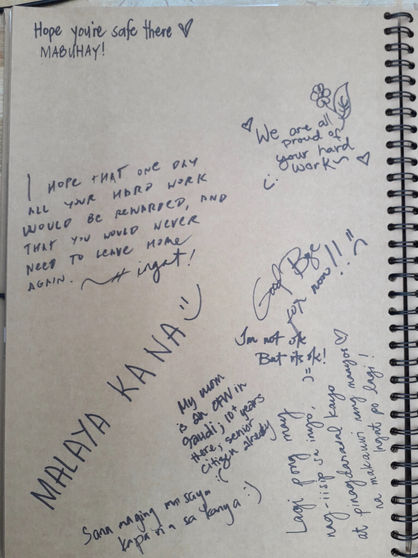NATHALIE DAGMANG
Padala
Migrants do not always have a recipient in mind for the things they send home. Back in the Philippines, their families open their boxes with mixed feelings. Sometimes, it is joy; other times, frustration. Stuff not only bonds but also clutters relationships, creating both connections and dis-connections.
This work is a collection of gifts sent from loved ones from overseas. Some sent to me by my aunt who works as a nurse in the US and some sent to a friend whose immediate family members comprise mostly of migrant workers.
Filipinos are the tenth-largest group of migrants to the UK from outside Europe. About 220,000 Filipinos live in the UK. Most are citizens or have leave to remain and many are professionals, employed as engineers, managers, and academics, as well as working in the care sector.
Project participants were mainly care and domestic workers on temporary work visas. In London, back garden sheds are sometimes turned into makeshift housing for people with limited resources whose immigration status prevents them from accessing state benefits. From beds in sheds people nest and nurture their aspirations and investments, making futures for themselves and their families in the UK and the Philippines.


CLICK ON ANY IMAGE





These paper flowers were made by members of the Filipino Domestic Workers Association for the Beyond Myself exhibition in London. The flowers travelled as part of the exhibition to Manila and Hong Kong.
The arch of flowers replicates those made for saint processions in the Philippines and in local spring and summer festivals in the UK as shown in Nathalie Dagmang’s film, Dios te Salva, screened here.
People working as domestic workers must ‘live in’ and their condition of stay as foreign residents is tied to their employer. On their days off, Filipinos recreate places of rest and solidarity outside the house in public space. Inside the house their incessant work and intimate labour are also devoted to people and households elsewhere.
CLICK ON ANY IMAGE











In Hong Kong, one in eight households employs a migrant domestic worker. Of the 370,000 documented people working as domestic workers, just over half (51%) are from the Philippines.
Sink or Swim
VOICES OF WOMEN MEDIA
These videos represent a sample of the work from the Visualizing the Voices of Migrant Women Workers project, a collaboration between Dr. Vivian Wenli Lin from Voices of Women Media and Dr. Julie Ham from the Department of Sociology at the University of Hong Kong.
As part of this project, a series of eight Sunday workshops on participatory video were offered to over 40 domestic workers, asylum-seekers, refugees and ethnic minorities in Hong Kong between February and April 2017.
Participants were trained in video production, including storyboarding, scripting, assembling crews, shooting, art direction, location scouting, sound production, and editing. The 42 one-minute videos produced by the participants explored themes of arrival, time off, connection and disconnection and the day to day realities of domestic work.
NATHALIE DAGMANG
Portrait of an Aunt from the Overseas
In the Philippines, the OFW usually becomes this estranged member of the family who is only recognized through her gifts and letters/cards.
This portrait is made out of all the birthday greeting cards that were sent to me every year by my Aunt who works as a nurse in Arizona, USA.






Museum visitors were invited to write a postcard to an OFW and drop it in a box provided in the exhibition. We then delivered them to participants in Hong Kong and London.






























































